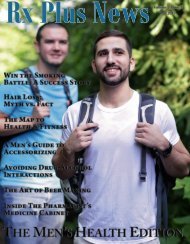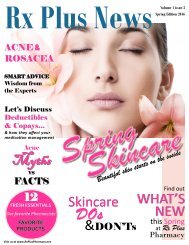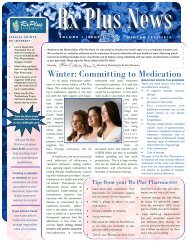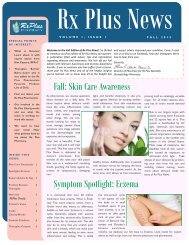JournalWinter2018NEW
You also want an ePaper? Increase the reach of your titles
YUMPU automatically turns print PDFs into web optimized ePapers that Google loves.
Rx Plus News
Dear Reader,<br />
Mental health is a state of well-being in which a person understands his or her own abilities,<br />
can cope with the normal stresses of life, can work productively and fruitfully, and can make<br />
contributions to his or her community. In this special edition of The Rx Plus News, we explore various<br />
topics that affect our mental health. In this edition we cover topics such as grief, anxiety, Seasonal<br />
Affective Disorder, and psychological as well as physical fitness. With an estimated 350 million<br />
people worldwide who suffer from depression, it is a leading cause of disability, as stated by<br />
the World Health Organization. We dedicate the centerfold of this winter 2018 edition to depression;<br />
to those who suffer alone and to those who have had the courage to find support. I hope these<br />
articles inspire you toward a positive step in the direction of self-love and self-care in 2018.<br />
Sincerely,<br />
Dr. Elisa R. Valenti<br />
Dr. Elisa Valenti, Director of Pharmacy<br />
On every cover of the Rx Plus News Journal, we are proud to feature members of the Rx Plus<br />
Pharmacy staff and this edition is no different. We like to highlight the loyal and hard<br />
working people that make Rx Plus Pharmacy a success and this season they are:<br />
<br />
<br />
<br />
<br />
Mishela Margan, Pharmacy Technician with puppy Luigi<br />
Sitting in the chair is Monica Santiago, Customer Care Representative<br />
Standing to the right is KelliAnn Foss, Retail Assistant Manager<br />
Seated on the ground is Priscella Ortiz, Delivery Department Associate<br />
Brian Foss, Pharm.D. Samantha Lanigan, Pharm.D. Christina Fiorello, Pharm.D. Arnold Barakayev, Pharm.D. Lauren DeMaio, Pharm.D.<br />
Please visit our website at<br />
www.RxPlusPharmacy.net/journal<br />
to read past editions of our journal,<br />
which have discussed topics<br />
such as men’s health, skin cancer<br />
awareness, animal cruelty and<br />
more.<br />
Find us on the Internet & Social Media!<br />
www.RxPlusPharmacy.net<br />
Photography by Lena Messana Photography and Journal Layout & Design by Daniela Amato
By Christian Mendoza, CEO Legacy Fitness ● MendozaFitness@gmail.com<br />
In today’s day, many factors play a role in the health<br />
and fitness of our mind and body. The human brain is complex.<br />
How our minds perceive stress will inevitably affect our<br />
emotional state. It is how we deal with those emotions that<br />
determine the outcome of the interaction between mind<br />
and body. Through imagine technologies, scientists<br />
have demonstrated how thoughts and emotions<br />
cause stimulation to certain parts of the brain. The<br />
signals, when activated, cause a chemical reaction<br />
throughout the body, displaying the relevance of<br />
the mind-body connection.<br />
Many mysteries of the brain await discovery<br />
but the reality of mind-body connection is irrefutable.<br />
Stress triggers various emotions like anger,<br />
grief, anxiety, depression, and joy. They start in our<br />
mind and transcend into our physical body by way<br />
of aches, pains, elevated blood pressure, hair loss,<br />
weight loss or gain. Long-term exposure to negative<br />
stress contributes to long-term disease.<br />
Meeting project deadlines, relationship dilemmas<br />
or professional situations are mental<br />
stress factors we experience every day. Even positive<br />
events like the birth of a child or the planning<br />
of a wedding can trigger emotions such as fear or anxiety.<br />
The good news is we can control the emotions that<br />
challenge our mental well being. Prior to them manifesting<br />
into physical ailments or illness, you can address those challenges<br />
or worries. Many people use over-the-counter and<br />
prescription medications to improve<br />
quality of life. Fitness is a non<br />
-medicinal remedy recognized<br />
worldwide and it is shown to positively<br />
influence mental health. Yoga,<br />
Pilates and meditation practices,<br />
applied by various cultures, calm<br />
our minds and improve our quality<br />
of life.<br />
With years of coaching people,<br />
through times of physical and<br />
emotional stress, I have found the<br />
combination of strength training<br />
coupled with cardiovascular activity is a successful approach.<br />
Exercise has been linked to the release of positive endorphin<br />
also known as feel-good-hormones. When challenged,<br />
through physical activity, our bodies stimulate a positive<br />
chemical reaction controlling high levels of cortisol. Cortisol<br />
is a stress hormone released by the adrenal gland during<br />
times of stress. In survival mode, cortisol helps to maintain<br />
fluid balance and blood pressure. It also regulates reproductive<br />
drive, immunity, digestion, and growth. When cortisol is<br />
chronically high in the bloodstream, it can suppress the immune<br />
system, increase blood pressure, increase glucose<br />
levels, decrease libido, produce acne, contribute<br />
to obesity and more. Regular exercise tends to decrease<br />
cortisol levels, leading to a reduction in symptoms<br />
of stress.<br />
The Journal of Allied Health & Sciences &<br />
Practice reports that aerobic exercise seems to have<br />
the greatest effect in reducing cortisol levels. Common<br />
forms of aerobic exercise include riding a bike,<br />
going for a brisk walk, skating, running, jumping rope<br />
and stair climbing. While just 20-30 minutes of aerobic<br />
exercise can help to reduce cortisol levels the<br />
American Heart Association recommends one hour<br />
of aerobic exercise daily. The<br />
average American only walks<br />
about half of the recommended<br />
daily amount of<br />
10,000 steps per day.<br />
Try different physical<br />
activities until you find the<br />
one that resonates with you<br />
and you can implement into<br />
your everyday life.<br />
The subject of mental health<br />
and its relevance to fitness is well<br />
researched. The benefits of exercise<br />
to mental and physical health are<br />
acknowledged worldwide. Fitness is<br />
subjective.<br />
Try<br />
different<br />
physical activities<br />
until<br />
you find the<br />
one that resonates<br />
with<br />
you and you<br />
can implement<br />
into<br />
your everyday<br />
life. It<br />
only works if<br />
you enjoy it and are willing to do it.<br />
Increased physical fitness will improve<br />
not only your physical being<br />
but make those seemingly impossible<br />
moments in life, easier to cope<br />
with.<br />
Inside this Issue:<br />
The Effect of Acne on<br />
Mental Health……...4<br />
What are Scars and<br />
How Can We Treat<br />
Them?.......................5<br />
Grief vs.<br />
Depression…………...6<br />
8 Symptoms You<br />
Didn’t Know Were<br />
Caused By<br />
Depression…….……..7<br />
Depression<br />
Medication Management……….…………….8<br />
My Life With<br />
Anxiety….……………….9<br />
Start 2018 with Self-<br />
Care………..……………..9<br />
What is Seasonal<br />
Affective<br />
Disorder.……………..10<br />
Coping with Loss….11<br />
Connect to Rx<br />
Plus……………………..12<br />
What’s New in the Rx<br />
Plus Gift Shoppe?...12
Acne is one of the most common diseases worldwide.<br />
Most people experience acne during adolescence.<br />
Adolescence is a time of very important physical, emotional<br />
and social development. Facial acne has a very big impact<br />
on emotions by causing adolescents to have negative<br />
feelings of self image that can lead to isolation and loneliness.<br />
In addition to the physical effects such as permanent<br />
scarring and disfigurement, acne has a long-lasting emotional<br />
effects that can affect the patient’s quality of life. Anxiety, depression,<br />
isolation and suicidal ideas are frequently seen in<br />
patients with acne and they should not be neglected in the<br />
therapy of acne patients. Research evidence suggests that<br />
these negative effects on the quality of life can be removed<br />
with appropriate acne treatment.<br />
The quality of life of acne patients has been compared<br />
to that reported by patients with chronic diseases such<br />
as asthma, epilepsy, diabetes, back pain or arthritis. No matter<br />
what the degree of the severity, patients with acne are at<br />
an increased risk of anxiety and depression compared to the<br />
non-affected population. Acne is considered a chronic disease<br />
owing to its prolonged course, pattern of recurrence and<br />
relapse. One study found that severe<br />
acne was also associated with ADD/<br />
ADHD and insomnia. Acne is a disease<br />
that affects an individual not<br />
only physically but also mentally and<br />
can leave a great impact on their<br />
quality of life. Therefore, treating acne<br />
has a beneficial effect on mental<br />
health.<br />
One study looked at bullying<br />
and teasing of patients with skin conditions<br />
including acne and found<br />
their negative effects on self esteem<br />
and self identity. Another study found that adolescents with<br />
acne feel uncomfortable, avoid eye contact and often attempt<br />
to disguise their lesions with their hair or cosmetics. Severe<br />
acne affects patients work situations as well and their ability<br />
to obtain employment. A greater impact on quality of life is<br />
associated with older age, female gender and longer acne<br />
duration. The way in which patients see their skin when it is<br />
seen by others has a big effect on the patient’s selfperception<br />
and may act as a barrier that prevents the patient<br />
Anxiety, depression,<br />
isolation and suicidal ideas<br />
are frequently seen in<br />
patients with acne and they<br />
should not be neglected in<br />
the therapy of acne patients.<br />
Dr. Antwan Haskoor, MD FAAP<br />
95-25 Queens Boulevard 1ST Floor<br />
Rego Park, NY 11374<br />
Tel: (718) 497-6711<br />
Fax: (718) 418-8248<br />
from participating in public<br />
sports and exercise. It is<br />
important to identify and<br />
treat affected teenagers at<br />
an early stage in order to<br />
alleviate individual impairment<br />
of quality of life and,<br />
as a result, reduce future<br />
socio-economic burdens of<br />
their acne. The more severe<br />
the skin condition is,<br />
the greater its impact will be<br />
on the patient’s<br />
life. Surveys have indicated<br />
that quality of life does not<br />
correlate with the physician’s<br />
assessment of acne severity. Even in mild form, acne<br />
has a detrimental and psychological effect on patients.<br />
One female, teenager in my practice who has mild<br />
acne was placed on the most powerful treatment (Accutane)<br />
by a Dermatologist because acne was affecting her self esteem<br />
and hindering her social life, causing<br />
her to seek out the most aggressive<br />
treatment. Some of my patients with<br />
acne and other skin diseases such as<br />
eczema or psoriasis have expressed to<br />
me how other kids look at them and<br />
treat them as if they were contagious<br />
which is totally false yet very damaging<br />
to one’s self esteem.<br />
In my practice, I usually offer<br />
help for acne during routine physical<br />
exams and most patients are very<br />
grateful and happy that I approached<br />
the subject and that I can and have helped. The desire for<br />
treatment is unrelated to the severity of acne. Some adolescents<br />
request prescriptions for very mild acne yet another<br />
might pass on treatment and yet their acne is a lot more severe.<br />
It is also very helpful to find a pharmacy that carries the<br />
various acne medications and products and is knowledgeable<br />
and experienced with this disease. It is important to consider<br />
acne as more than a mere cosmetic problem and to include<br />
all of its negative affects in its management and care.<br />
Rx Plus Pharmacy is a URAC accredited dermatology specialty pharmacy.<br />
“By receiving URAC accreditation, Rx Plus Pharmacy has demonstrated a commitment to quality<br />
health care. Quality health care is crucial to our nation’s welfare, and it is important to have organizations<br />
that are willing to measure themselves against national standards and undergo rigorous evaluation<br />
by an independent accrediting body.” - URAC President and CEO Kylanne Green<br />
Please call to speak to one of our pharmacists about your dermatological needs today.<br />
Keloid Scars Hypertrophic Scars Contracture Scars Acne Scars
“Scars” are normal healing responses to traumatized<br />
skin. As a wound heals, scar tissue forms, which at first is often<br />
red and somewhat prominent. Over several months, the<br />
red scar usually becomes flat and pale.<br />
Silicone gel is cosmetically elegant, easy to apply, and<br />
can be worn under makeup and sunscreen. Acting as a barrier<br />
to water loss, silicone helps lock in moisture, which is what<br />
skin needs to heal and thrive. Wounds don’t heal as effectively<br />
if they are dry. Silicone gel works its<br />
Silicone gel is cosmetically<br />
elegant, easy to<br />
apply, and can be worn<br />
under makeup and<br />
sunscreen.<br />
magic on the top layer of the skin, called<br />
the epidermis. Not only has it been<br />
proven to improve scar appearance, it<br />
also reduces that raw, red appearance<br />
indicative of scarring. It also relieves<br />
pain and itching, with the ability to treat<br />
all types of scars, such as hypertrophic<br />
scars. In addition, it can soften scars and<br />
boost skin elasticity, which helps them<br />
heal.<br />
Patients with scars often search drugstore aisles looking<br />
for help, only to find a “jungle” of products from which to<br />
choose. Though many brands claim to help, Serica Moisturizing<br />
Scar Formula is unique, because it's formulated with a special<br />
blend of ingredients, including Amazonian Pracaxi oil and<br />
a patented network of semipermeable silicones that help to<br />
improve the appearance of scars and stretch marks.<br />
Serica Moisturizing Scar formula is a dermatologist<br />
recommended product designed to improve the appearance<br />
of old, new, and acne scars. It is the first commercially available<br />
skin care line to contain Pracaxi oil. Pracaxi oil, known for<br />
its highly moisturizing properties and is derived from the seed<br />
of the Pentaclethra macroloba<br />
(Pracaxi) tree found in the Amazon<br />
rainforest. Pracaxi oil contains essential<br />
fatty acids; behenic and linoleic<br />
acids, which work synergistically to<br />
promote skin elasticity and moisture<br />
retention. Although scars cannot be<br />
completely eliminated, you will see<br />
dramatic results in<br />
the tone and texture<br />
of the skin when using<br />
Serica.<br />
The Collagen<br />
P.I.N. is a revolutionary<br />
micro-needling<br />
device which aims to<br />
tighten, lift and rejuvenate<br />
skin. The Collagen<br />
P.I.N. is the latest<br />
and most advanced model available<br />
today. The Collagen P.I.N. has<br />
many benefits:<br />
<br />
<br />
<br />
<br />
<br />
<br />
Dr Steven J. Brooks<br />
Brooks Dermatology<br />
Manhasset<br />
444 Community Drive,<br />
Suite 102<br />
Manhasset, NY 11030<br />
Phone: (516) 439-4707<br />
Fax: (516) 439-4709<br />
Safer and more effective in piercing the skin than traditional<br />
skin needling rollers<br />
Has a superior effect on collagen and elastin rejuvenation<br />
Multi-speed and adjustable needle depth<br />
Highest effectiveness<br />
Effectively treat hard-to-reach places<br />
Promotes scar-less healing and natural collagen<br />
reproduction
DE·PRES·SION<br />
dəˈpreSH(ə)n/<br />
An act of depressing or a state of being depressed: such as a<br />
1. a state of feeling sad : dejection anger, anxiety, and depression<br />
2. a mood disorder marked especially by sadness, inactivity, difficulty in thinking<br />
and concentration, a significant increase or decrease in appetite and<br />
time spent sleeping, feelings of dejection and hopelessness, and sometimes<br />
suicidal tendencies bouts of depression suffering from clinical depression<br />
The death of a loved one, loss of a job or the ending of a relationship are difficult experiences for a person to<br />
handle. In these situations, it is normal for feelings of sadness or grief to develop in response. Those experiencing loss<br />
often describe themselves as being “depressed.” But being sad is not the same as having depression. The grieving process<br />
is natural and unique to each individual and shares some of the same features of depression. Both grief and depression<br />
may involve intense sadness and withdrawal from usual activities. -American Psychiatric Association<br />
In grief, painful feelings come in waves, often<br />
intermixed with positive memories of the deceased.<br />
In grief, self-esteem is usually maintained.<br />
In major depression, mood and/or interest (pleasure) are<br />
decreased for most of two weeks or longer.<br />
In major depression, feelings of worthlessness and selfloathing<br />
are common.<br />
<br />
<br />
<br />
<br />
<br />
<br />
<br />
<br />
Sadness, despair, mourning<br />
Fatigue or low energy<br />
Tears<br />
Loss of appetite<br />
Poor sleep<br />
Poor concentration<br />
Happy and sad memories<br />
Mild feelings of guilt<br />
<br />
<br />
<br />
<br />
<br />
<br />
<br />
<br />
<br />
Worthlessness<br />
Exaggerated fatigue<br />
Suicidal thoughts<br />
Low self-esteem<br />
Powerlessness<br />
Helplessness<br />
Agitation<br />
Exaggerated guilt<br />
Loss of interest in pleasurable activities<br />
Gradually and after an undetermined amount<br />
of time, these feelings remit as the individual<br />
regains their equilibrium as they return to normal<br />
life.<br />
In major depression, these feelings are unremitting and<br />
carry with them the real danger of suicide. Daily functioning<br />
at work and home are impaired and the individual feels<br />
as if they will never climb out of these feelings.<br />
Need help? Go to MentalHealth.net for more<br />
information<br />
If you are thinking about suicide, don’t hesitate to call<br />
1-800-273-TALK to discuss this with someone at the<br />
National Suicide Prevention Lifeline.<br />
FIND SUPPORT...especially when you feel like isolating yourself<br />
EXPRESS GRATITUDE...name three things you are grateful for each morning or night.<br />
JOURNAL YOUR FEELINGS...daily to help release those negative emotions.<br />
LEAN ON YOUR FAITH...spirituality or something greater than you.<br />
REDISCOVER ACTIVITIES...and hobbies that bring you peace, joy, and vitality.<br />
EXERCISE DAILY...15-20 minutes of cardio is all it takes to release feel-good hormones.<br />
PRACTICE MINDFULNESS...be in the moment.
By Elisa R. Valenti, Pharm.D<br />
Depression strips you of the<br />
chemicals that boost energy.<br />
It is normal to feel tired<br />
after a hard day’s work but<br />
feeling exaggeratedly, exhausted<br />
after a 13-hour<br />
night’s sleep, day after day,<br />
is distinguishable from feeling<br />
tired. Patients report<br />
themselves unable to get<br />
out of bed to do their normal<br />
activities due to unexplained<br />
or exaggerated exhaustion.<br />
Sufferers describe<br />
feelings of worthlessness<br />
associated with their inability<br />
to “shake off” how they<br />
feel.<br />
Depression decreases our<br />
ability to enjoy the activities<br />
we normally enjoy. Many<br />
sufferers of depression<br />
simply don’t desire the<br />
physical connectedness of<br />
intercourse. They report<br />
feeling uninterested in intimacy<br />
or isolate themselves<br />
from their partner. This can<br />
sometimes cause strain between<br />
partners as the nondepressed<br />
partner may not<br />
understand why the distance<br />
has been placed between<br />
them. They also may<br />
not make the connection<br />
that the isolation has nothing<br />
to do with them but has<br />
everything to do with their<br />
partner’s depression. This<br />
may add to the sufferer's<br />
feelings of guilt.<br />
Most days we are sharp and<br />
focused. But people suffering<br />
from depression, may<br />
experience a consistent regular<br />
pattern of days where<br />
they are not “on the ball”.<br />
They make frequent unusual<br />
mistakes or feel uncharacteristically<br />
clumsy. As a<br />
result, poor concentration<br />
or indecisiveness may keep<br />
us from performing at our<br />
best. Sufferers describe<br />
feeling powerless that they<br />
are unable to muster the<br />
strength to change how<br />
they feel.<br />
Symptoms of depression or<br />
stress may not present<br />
themselves in the usual<br />
way. Many times, patients<br />
will have physical symptoms<br />
they can’t explain. Patients<br />
may have persistent muscle<br />
or joint pain, gastric or<br />
stomach pain, or physical<br />
symptoms like headache,<br />
among others. When we try<br />
to suppress the feelings of<br />
depression, in time they<br />
may release themselves as<br />
physical ailments we can’t<br />
justify.<br />
“If you are depressed you are living in the past. If you are anxious you are living in the<br />
future. If you are at peace you are living in the present.” ― Lao Tzu<br />
On the other side of feeling<br />
overly tired, depressed patients<br />
report feeling constantly<br />
restless or unable to<br />
get comfortable. This may<br />
or may not be accompanied<br />
by the feeling of agitation<br />
toward normally trivial obstacles.<br />
It is not uncommon<br />
for patients who are depressed<br />
to present with<br />
feelings of anger or irritation<br />
and snap at the littlest<br />
things or at the people they<br />
love most.<br />
When a negative mood hits,<br />
we may resort to comfort<br />
foods to boost the feelgood-hormones<br />
in our<br />
brains. We may also overeat<br />
in response to our constant<br />
feelings of exhaustion. As a<br />
result of trying to fix our<br />
mood with food, one gains<br />
weight. The excess weight<br />
may increase feelings of<br />
insecurity and lower selfesteem,<br />
adding to the cycle<br />
of depression. Sufferers<br />
report feeling helpless in<br />
changing this cycle.<br />
Depression can cause<br />
sufferers to essentially,<br />
withdraw from life and isolate<br />
themselves from the<br />
people or activities they<br />
once enjoyed. Patients report<br />
feeling numb, empty or<br />
simply don’t care about engaging<br />
in the activities, hobbies,<br />
holidays, or social<br />
functions that once, colored<br />
their worlds. Sufferers<br />
will feel a constant and general<br />
sense of low, grey or<br />
blue mood. In some cases,<br />
sufferers of depression describe<br />
having thoughts of<br />
death or dying when life<br />
doesn't seem worth living.<br />
Our dreams are the product<br />
of our thoughts. Depressed<br />
patients may report movielike,<br />
vivid dreams of disturbing<br />
or troubling scenes.<br />
When we are troubled and<br />
don’t have an outlet by<br />
which to express our emotions,<br />
our mind may replay<br />
those negative feelings in<br />
dreams or nightmares.
Anxiety and depression are common medical conditions.<br />
The CDC estimates that 1 in 20 people over the age of<br />
12 are living with anxiety or depression. Mental health can be<br />
intimidating to discuss. However, it is very important to be<br />
treated for these conditions.<br />
Some common anxiety and depression treatments<br />
include Zoloft (sertraline), Cymbalta (duloxetine), Lexapro<br />
(escitalopram), Prozac (fluoxetine), Celexa (citalopram), Wellbutrin<br />
(bupropion), Abilify (aripiprazole), Effexor<br />
(venlafaxine), Paxil (paroxetine), Viibryd (vilazodone), Trintellix<br />
(vortioxetine), Remeron (mirtazepine), Pristiq<br />
(desvenlafaxine), Xanax (alprazolam), Valium (diazepam), and<br />
Klonopin (clonazepam).<br />
By Laura A. Kalschmid,<br />
PharmD Candidate 2018<br />
There are side effects that may occur when taking<br />
these medications. The benefits of treatment nearly always<br />
outweigh the risk of side effects from these medications.<br />
Some patients experience sleep disturbances, daytime<br />
drowsiness, dry mouth, dry skin, dry eyes, weight gain, suicidal<br />
thoughts, and sexual side effects. These side effects do not<br />
affect every person. Some people can experience multiple<br />
side effects and others may not experience any at all. Many<br />
patients find side effects of these medications difficult to<br />
manage. Your Rx Plus pharmacist can help you manage these<br />
side effects. Our pharmacists know multiple ways to help you<br />
find a solution and they can work with your physician to find<br />
the best treatment option for you.<br />
Physical symptoms may include headache, joint pain, muscle aches, nausea, skin rashes, or diarrhea. Although these symptoms<br />
may seem alarming to you, they are usually mild and temporary. It is important to understand that you may not see any<br />
significant improvements for anxiety and depression symptoms until two to four weeks after you begin your medication. This<br />
means it is important for you to take the medication each day so that your provider can assess the full benefit the medication<br />
has for you. However, if you experience severe side effects, call your provider immediately.<br />
There are multiple ways to manage dryness caused by depression and anxiety medications. You may begin to notice that you<br />
have dry mouth. For some people, a lozenge or cough drop is sufficient. For others, a medicated, over the counter product<br />
called Biotene can be helpful. This product is specially formulated to combat dry mouth and comes in various formulations<br />
including a mouth rinse/wash, spray, gel, toothpaste, and lozenge. There are many over the counter options for dry skin. These<br />
include Aquaphor, CeraVe, Eucerin, and Aveeno. Dry eyes can be managed through a number of over the counter eye<br />
drops including Systane Ultra and Refresh. If you have any additional questions on over the counter or prescription dryness<br />
treatment or side effect concerns, your Rx Plus pharmacist can find the best product for you.<br />
Many people notice trouble sleeping when they first start taking an antidepressant — trouble falling asleep or that they wake<br />
up easily during the night. This can include nightmares and sleepwalking. Consider taking the medication when you first wake<br />
up to prevent you from being kept awake at night. If sleep disturbances do not resolve, consider speaking with your provider<br />
to see if this medication is the best fit for you.<br />
This can be a direct sedative effect or a side effect of the at night wakefulness. If you feel drowsy on a medication, it is best<br />
not to drive, handle heavy machinery, or make important decisions while you feel this way. Taking these medications at night<br />
can help combat this side effect.<br />
This is one of the most common reasons that patients stop taking their medication or need to change medications. It is associated<br />
with long term use of antidepressants. Getting 30 minutes of exercise on most days of the week should help prevent<br />
weight gain. Eating smaller, well balanced meals may also help with weight loss. If you are still struggling with weight, ask your<br />
provider if you would benefit from a change in antidepressant therapy such as switching to Wellbutrin (Bupropion) which is<br />
associated with weight loss or Effexor (Venlafaxine) which is not associated with weight loss or weight gain.<br />
Taking an antidepressant may increase the risk of suicidal thinking. In fact, taking an SSRI or another antidepressant doubles<br />
the risk for suicidal thinking. Keep in mind, the overall risk of this depression medication side effect for children, teens, and<br />
adults is 2 to 4 percent. One reason why antidepressants may lead to suicide is<br />
that they may give a person enough energy to carry out a suicide plan. Regular follow-up with your doctor is the best way to<br />
prevent this rare side effect and you should let them know immediately if you feel more depressed and/or have suicidal<br />
thoughts. Good communication with your physician, pharmacist, and/or therapist is vital to preventing this from occurring.<br />
Antidepressants can also be associated with sexual dysfunction. This can be an embarrassing side effect to bring up with your<br />
physician or pharmacist but it is important that it be addressed and/or treated. Sexual dysfunction can have a negative impact<br />
on a person’s relationship with their partner and can lead to a strain on their own emotions. Speak to your provider<br />
about a possible dose adjustment. Lower doses of antidepressants have been associated with a lower risk for sexual dysfunction.<br />
Switching to another antidepressant can be helpful as well. Wellbutrin (Bupropion), Viibryd (Vilazodone), and Trintellix<br />
(Vortioxetine) have the lowest risk for sexual side effects.
It’s happening again- my fingers are starting to tingle. My<br />
heart is racing. What is going on? Why are my arms numb? I’m 20<br />
years old, I can’t be having a heart attack. “Priscella, are you<br />
okay?”, my cousin asked as I clenched the red scarf around my<br />
neck. I couldn’t respond. I could see her handing me a glass of<br />
water, I could see her lips moving, and I heard the noise of all the<br />
people around me, but I could only concentrate on the sound of<br />
my heart beating faster and faster in my chest.<br />
I felt cold. A breeze of cool air hit my face like waking up<br />
from a sudden sleep. I could hear my mother, my cousin and my<br />
family around me when I realized they<br />
took me outside. I was sitting outside, on<br />
By Priscella Ortiz, Rx Plus Pharmacy Delivery Department<br />
a kitchen chair while the party was going<br />
on inside. “What is going on?, I asked” My<br />
cousin looked in my eyes, looking into<br />
eyes that didn’t recognize her and said,<br />
“Priscella, I think you are having a panic<br />
attack.”<br />
“I don’t have panic attacks”, I assured<br />
her. “I just don’t feel good sometimes”.<br />
The feeling went away, just like<br />
that, like nothing happened and I was left feeling embarrassed. I<br />
felt confused. I just wanted to go back inside and regain my composure.<br />
Over the course of the next few months, these feelings<br />
would come and go and I would tell myself I was fine. I would<br />
deal with them in whatever way I could. I knew the minute it was<br />
starting. After one too many of these attacks, I knew it was time<br />
to seek some help.<br />
My cousin was right. By the end of my appointment, my<br />
doctor confirmed it. He told me I was having anxiety attacks. He<br />
gave me a prescription for some medication. I was reluctant to<br />
pick it up from the pharmacy. I spoke with my pharmacist, who<br />
told me the medication may cause some drowsiness, that would<br />
go away after I got used to it; I just needed to be patient. It did<br />
just that, it made me feel sleepy and I was not patient. Against<br />
the advice of my doctor and pharmacist, I stopped taking the<br />
medicine. I didn’t want to take medication; I wanted to be in control<br />
of myself. The hard-headed person in me wanted to take<br />
care of myself. So, I resorted to cigarettes in an attempt to selfmedicate<br />
myself, but smoking<br />
only made me feel worse. I tried<br />
taking vitamins but forget to<br />
take them most of the time. I<br />
reached the point where just<br />
dealing with it, was the only option<br />
I would accept.<br />
I know when the feeling<br />
is starting, I know that it affects<br />
how I feel, my mood, my<br />
productivity<br />
at work<br />
“My anxiety teaches me to<br />
try and stay calm and keep<br />
the mind, body and soul<br />
happy because the mind<br />
and soul are connected.“<br />
and my<br />
interaction with those around me. The feelings<br />
creep up on me when I least expect it.<br />
I’m learning how to control my feelings and<br />
learn my triggers and accept that. I’m trying<br />
to control my emotions and surroundings<br />
but it’s not easy. Sometimes I’ll get a<br />
chill so I’ll always carry a sweater. Other<br />
times, I’ll get a chill that turns into a sweat.<br />
A cold sweat that turns into a mixture of<br />
hot and cold feelings all over my body. I’ll breathe deeply or talk<br />
myself out of it, or put water on my face or look to my friends for<br />
support during those moments. I have taught myself to remember<br />
that the feeling will pass and I will pull myself back.<br />
If you are reading this article and struggle with these<br />
same feelings, you're not alone. You don’t have to cope alone.<br />
You can opt for medicine, you can opt for talk therapy, you can<br />
opt for accepting help. You don’t have to fight through this alone.<br />
My anxiety has taught me to try and stay calm and keep<br />
the mind, body and soul happy because the mind and soul are<br />
connected. My anxiety teaches me to to practice self-care and to<br />
laugh more and find happiness even in life’s troubles. Finding<br />
positivity in the light of negativity that surrounds us, is the best<br />
medicine for me. I deliberately participate in activities that promote<br />
positivity in my life in order to take care of my mental,<br />
emotional, and physical health.<br />
My name is Priscella. I'm 29 years old and anxiety is part<br />
of my life.<br />
In what ways do you take care of yourself? Do you practice<br />
self-care? In our fast paced world, it is easy to lose sight of<br />
oneself and neglect our essential need for self-care.<br />
What is self-care? It seems like a<br />
simple concept but often it is overlooked.<br />
Self-care is an action we intentionally and<br />
purposefully do to promote our mental,<br />
emotional, and physical health. Practicing<br />
good self-care is essential to improved<br />
mood and reduced anxiety. Self-love starts<br />
with self-care and is fundamental to a<br />
good relationship with oneself and others.<br />
Self-care is not an activity we force<br />
ourselves to do or an obligation. It is an activity that nourishes<br />
our soul and ignites our spirit; it gives to our soul and does not<br />
take away from us.<br />
Take Time to Do<br />
What Makes Your<br />
Soul Happy<br />
Practicing self-care is not a selfish act. It is not about placing our<br />
needs above others. Instead it is about doing the things we need<br />
to do to take care of ourselves. We learn this idea every time we<br />
board an aircraft. If a child is seated beside<br />
you, we are told to put on our own mask<br />
before helping to put a mask on the child.<br />
Without performing self-care, we won’t be<br />
in the place to provide of ourselves for others.<br />
The key to finding balance in life is<br />
practicing self-care. Balance does not just<br />
happen. One must actively engage in planning<br />
and being conscious of one's choices<br />
to achieve it. Self-care involves being mindful of what one does<br />
and doesn’t do and incorporating those choices into a routine.<br />
1. Create a “no” list, with things you know you don’t like or you<br />
no longer want to do. Examples might include: Not checking<br />
emails at night, not attending gatherings you don’t like, not<br />
answering your phone during lunch/dinner.<br />
2. Promote a nutritious, healthy diet.<br />
3. Get enough sleep. Adults usually need 7-8 hours of sleep.<br />
4. Find an exercise you like to boost mood and energy.<br />
5. Don’t put off a follow-up visit with the doctor.<br />
6. Use relaxation exercises and/or practice meditation any time.<br />
7. Spend enough time with your loved ones. Nothing relieves<br />
stress better than a hug.<br />
8. Do at least one relaxing activity every day<br />
9. Do at least one pleasurable activity every day<br />
10. Find reasons to laugh!
SAD is a type of depression that comes and goes with the seasons, most commonly late fall<br />
and winter, and goes away during the spring or summer. It is thought that SAD is related to changes<br />
in the amount of daylight during different times of the year, and this disorder has a much higher<br />
prevalence in areas that are located far from the equator and have long winters.<br />
Similar to patients who have depression, patients with SAD experience feelings of sadness, worthlessness,<br />
irritability. You may lose interest in activities that normally bring you joy. Other symptoms<br />
include difficulty sleeping or oversleeping, weight gain and cravings, and thoughts of suicide. These<br />
symptoms are usually significant enough to cause marked impairment in daily functioning.<br />
SAD occurs in about 5% of US population in any given year, with symptoms present for about 40% of<br />
the year.<br />
<br />
<br />
<br />
<br />
Being a female - four times as many women are diagnosed with SAD than men.<br />
Having family members with SAD or depression<br />
Co-existing depression or bipolar disorder<br />
Young age - your chances of getting SAD decrease as you get older<br />
Malgorzata Slugocki, PharmD<br />
Assistant Professor of<br />
Pharmacy Practice<br />
Fairleigh Dickinson University<br />
School of Pharmacy<br />
230 Park Avenue, M-SP1-01<br />
Florham Park, NJ 07932<br />
(973)-443-8205<br />
slugocki@fdu.edu<br />
If you experience the above symptoms and you noticed they only occur in late fall and winter, and have any of the above risk<br />
factors, chances are that you may have SAD. Make sure to talk to your physician so that you get properly diagnosed.<br />
There are three main treatment strategies to manage<br />
SAD: light therapy, cognitive behavioral therapy (CBT) and<br />
antidepressant medications. All three options are appropriate,<br />
and the choice of treatment depends on patient preference.<br />
Light therapy includes daily sessions, about 30<br />
minutes in duration, in front of a special light box, that emits<br />
a bright light that mimics natural sunlight. This therapy<br />
should continue until enough sunlight returns (usually in the<br />
spring). Stopping early may result in return of symptoms. Do<br />
not use tanning beds to treat SAD as they contain UV rays<br />
that may damage your eyes and skin.<br />
CBT is an approach in psychotherapy that can help<br />
you replace negative thoughts with positive ones. You can<br />
also learn how to manage stress.<br />
Medications used for SAD mainly include selective<br />
serotonin reuptake inhibitors (SSRIs) that are also commonly<br />
used to treat depression. These are associated with a number<br />
of adverse effects and also have to be taken for several<br />
weeks before improvement is seen.<br />
The keys to living with SAD are to plan ahead and manage your symptoms:<br />
Follow your treatment plan - stay compliant with medications, appointments, and follow up if things aren't working<br />
Take care of yourself - eat healthy, exercise, get enough sleep<br />
Learn to manage stress - find ways to<br />
Don't turn to alcohol or drugs - they make depression worse<br />
Don't isolate yourself - surround yourself with people and reach out<br />
Plan ahead - some patients purposely plan their lives to be busy<br />
around the time they feel down<br />
<br />
<br />
<br />
<br />
<br />
<br />
<br />
Are my symptoms likely indicative of SAD?<br />
What is causing my SAD?<br />
Which treatment is best for me?<br />
How long will I continue my treatment?<br />
Should I make any changes to my diet?<br />
What changes can I make at home to help myself?<br />
Can I exercise to help me deal with SAD?<br />
FamilyDoctor.org: https://familydoctor.org/condition/seasonal-affective-disorder/<br />
National Institute of Mental Health: https://www.nimh.nih.gov/health/topics/seasonal-affective-disorder/<br />
index.shtml<br />
Mayo Clinic.org, https://www.mayoclinic.org/diseases-conditions/seasonal-affective-disorder/symptomscauses/syc-20364651
Grief hits us like a freight train, sometimes<br />
when we least expect it. I’ll never forget the ice-cold<br />
feeling that coursed through my veins when the ringing<br />
of my phone woke me up on August 27 th 2016.<br />
Looking at the caller ID the name that flashed across<br />
the screen told me everything I needed to know without<br />
answering: My aunt had passed away. Just three<br />
months prior my family and I learned about her diagnosis<br />
of bladder cancer and we spent as many hours<br />
as we could by her side. I found myself having difficulty<br />
wrapping my brain around her quick deterioration<br />
so I took to burying what I was feeling and focused<br />
on being someone my cousin and my mom<br />
could lean on.<br />
When the call<br />
of her passing came<br />
my immediate thought<br />
was how is everyone<br />
else and what could I<br />
do for them? I ran on<br />
autopilot for a few<br />
months, until my<br />
grandmother’s passing.<br />
She was brokenhearted<br />
after losing<br />
her daughter 5 months prior. As I sat on a plane flying<br />
4,000 thousand miles across the world to attend the<br />
funeral I was suddenly hit with the full weight of the<br />
emotions I had been burying for so long, two very important<br />
women in my life were gone and I’d never get<br />
them back. I felt my insides shatter at the thought and<br />
my world came to a screeching halt.<br />
I know now that depression had<br />
sunk its claws into me but at the time my<br />
By Mishela Margan, Rx Plus Pharmacy Technician<br />
“What we have once<br />
enjoyed deeply we can<br />
never lose. All that we love<br />
deeply becomes a part of us.”<br />
–Helen Keller<br />
mind wasn’t clear enough to notice the<br />
signs as I struggled with grief. Forgotten,<br />
was the person that always had a smile<br />
and hug at the ready to brighten someone<br />
else’s day. What was left was a woman<br />
with a short fuse looking for the smallest<br />
irritant to blow up on. I began to isolate<br />
myself from the people I once laughed<br />
with and I slowly started to see the grey<br />
cloud that would appear when I entered a room. I didn’t<br />
like this new version of myself but when it came to<br />
making changes in my life I felt like I was in a hole<br />
that I couldn’t climb out of. I was mentally and physically<br />
exhausted not knowing<br />
what else to do I made an<br />
appointment to see my doctor.<br />
I had to be honest about<br />
why I was sitting in his office,<br />
I knew I couldn’t help<br />
myself because I didn’t<br />
know how and so I tried my<br />
best to explain everything<br />
swimming around in my<br />
head, in doing so, a qualified<br />
health professional,<br />
was able to teach me the<br />
signs and symptoms of depression such<br />
irritability, anxiety, and sleep issues all of<br />
which I had been experiencing and we<br />
were able to work together on finding the<br />
best therapy so I could start healing.<br />
It didn’t happen over night, in fact<br />
it’s been a little over a year and I still have<br />
some bad days, but in speaking with a<br />
doctor I learned that asking for help is a<br />
sign of strength, not weakness. Accomplishing<br />
that, first step helped me take<br />
more. I researched the stages of grief<br />
to understand what I was feeling (or experiencing).<br />
Through online support forums I was able to find positive<br />
ways of coping, instead of burying emotions I<br />
started learning to work through them. I reached out<br />
to friends and opened up about how I had been feeling.<br />
I learned some had been through similar situations.<br />
From their suggestions I began to keep a journal,<br />
writing in it has<br />
become cathartic for<br />
me.<br />
...in speaking with a doctor I<br />
learned that asking for help<br />
is a sign of strength, not<br />
weakness.<br />
When I miss my<br />
aunt and grandma it’s<br />
easy to start to feel<br />
sad but instead I think<br />
of all the things that<br />
they’ve taught me,<br />
how they’ve helped<br />
shape me, and all the<br />
wonderful memories I’m lucky enough to have.<br />
They’re no longer a call, bus, or plane ride away but<br />
the essence of who they were will always remain with<br />
me.
Thanks to our excellent Pharmacists and staff, Rx Plus Pharmacy is a region leader in<br />
patient care and serves thousands of patients in the region with free delivery in<br />
the New York and surrounding areas. We look forward to providing you the very best<br />
pharmaceutical care. If you have any prescriptions you need filled, be sure to contact<br />
us; our staff would be happy to assist.<br />
There are now so many ways to Connect to Rx Plus Pharmacy!<br />
Have a question about<br />
your prescription, delivery<br />
status, insurance or a<br />
health question? Shoot us<br />
a text at 718-456<br />
456-0100.<br />
You can also reach us at<br />
that number if you need<br />
to speak to a pharmacist<br />
or representative.<br />
Want to have Rx Plus Phar-<br />
macy at your fingertips at<br />
all times? Well, now you<br />
can! Download our new<br />
mobile app today to refill<br />
prescriptions, set medica-<br />
tion reminders, view store<br />
information, and more!<br />
Visit our website at<br />
www.RxPlusPharmacy.net<br />
for more information.<br />
You can now convenient-<br />
ly refill your prescription<br />
online on our website<br />
www.RxPlusPharmacy.n<br />
et. Simply click on the<br />
RefillRx button (like the<br />
one you see above!) and<br />
fill out the form to sub-<br />
mit your<br />
refill request.<br />
See what’s happening at<br />
Rx Plus Pharmacy! Con-<br />
nect to us via Instagram<br />
and Facebook to get the<br />
latest news, upcoming<br />
events, sales and pro-<br />
motions and to see the<br />
newest pictures of our<br />
staff and pharmacy.<br />
Stop in to the Rx Plus Gift Shoppe today to shop the Katie Loxton London line of accessories<br />
and gifts, a new addition to the many beautiful gift ideas the Shoppe has to offer!<br />
JEWELRY<br />
PURSES<br />
TECH<br />
ACCESSORIES<br />
KEY<br />
RINGS<br />
TRAVEL<br />
ACCESSORIES<br />
71-30 Myrtle Avenue<br />
Glendale, NY<br />
Phone: 718-456-0100<br />
Fax: 718-456-0300<br />
Find us at www.RxPlusPharmacy.net,<br />
Facebook, Yelp & Instagram<br />
Email: prescriptions@rxpluspharmacy.net<br />
Store Hours<br />
Monday – Friday Saturday Sunday<br />
8:00 – 8:30 PM 9:00-6:00 PM 9:00-4:00 PM













